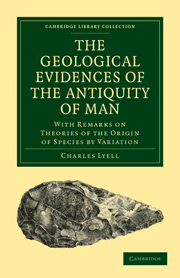 The Geological Evidences of the Antiquity of Man
The Geological Evidences of the Antiquity of Man Book contents
- Frontmatter
- Contents
- CHAPTER I INTRODUCTION
- CHAPTER II RECENT PERIOD—DANISH PEAT AND SHELL MOUNDS—SWISS LAKE DWELLINGS
- CHAPTER III FOSSIL HUMAN REMAINS AND WORKS OF ART OF THE RECENT PERIOD
- CHAPTER IV POST-PLIOCENE PERIOD: BONES OF MAN AND EXTINCT MAMMALIA IN BELGIAN CAVERNS
- CHAPTER V POST-PLIOCENE PERIOD: FOSSIL HUMAN SKULLS OF THE NEANDERTHAL AND ENGIS CAVES
- CHAPTER VI POST-PLIOCENE ALLUVIUM AND CAVE DEPOSITS WITH FLINT IMPLEMENTS
- CHAPTER VII PEAT AND POST-PLIOCENE ALLUVIUM OF THE VALLEY OF THE SOMME
- CHAPTER VIII POST-PLIOCENE ALLUVIUM WITH FLINT IMPLEMENTS OF THE VALLEY OF THE SOMME—concluded
- CHAPTER IX WORKS OF ART IN POST-PLIOCENE ALLUVIUM OF FRANCE AND ENGLAND
- CHAPTER X CAVERN DEPOSITS, AND PLACE OF SEPULTURE OF THE POST-PLIOCENE PERIOD
- CHAPTER XI AGE OF HUMAN FOSSILS OF LE PUY IN CENTRAL FRANCE AND OF NATCHEZ ON THE MISSISSIPPI, DISCUSSED
- CHAPTER XII ANTIQUITY OF MAN RELATIVELY TO THE GLACIAL PERIOD AND TO THE EXISTING FAUNA AND FLORA
- CHAPTER XIII CHRONOLOGICAL RELATIONS OF THE GLACIAL PERIOD AND THE EARLIEST SIGNS OF MAN'S APPEARANCE IN EUROPE
- CHAPTER XIV CHRONOLOGICAL RELATIONS OF THE GLACIAL PERIOD AND THE EARLIEST SIGNS OF MAN'S APPEARANCE IN EUROPE—continued
- CHAPTER XV EXTINCT GLACIERS OF THE ALPS AND THEIR CHRONOLOGICAL RELATION TO THE HUMAN PERIOD
- CHAPTER XVI HUMAN REMAINS IN THE LOESS, AND THEIR PROBABLE AGE
- CHAPTER XVII POST-GLACIAL DISLOCATIONS AND FOLDINGS OF CRETACEOUS AND DRIFT STRATA IN THE ISLAND OF MÖEN, IN DENMARK
- CHAPTER XVIII THE GLACIAL PERIOD IN NORTH AMERICA
- CHAPTER XIX RECAPITULATION OF GEOLOGICAL PROOFS OF MAN'S ANTIQUITY
- CHAPTER XX THEORIES OF PROGRESSION AND TRANSMUTATION
- CHAPTER XXI ON THE ORIGIN OF SPECIES BY VARIATION AND NATURAL SELECTION
- CHAPTER XXII OBJECTIONS TO THE HYPOTHESIS OF TRANSMUTATION CONSIDERED
- CHAPTER XXIII ORIGIN AND DEVELOPMENT OF LANGUAGES AND SPECIES COMPARED
- CHAPTER XXIV BEARING OF THE DOCTRINE OF TRANSMUTATION ON THE ORIGIN OF MAN, AND HIS PLACE IN THE CREATION
- INDEX
CHAPTER XXI - ON THE ORIGIN OF SPECIES BY VARIATION AND NATURAL SELECTION
Published online by Cambridge University Press: 29 August 2010
- Frontmatter
- Contents
- CHAPTER I INTRODUCTION
- CHAPTER II RECENT PERIOD—DANISH PEAT AND SHELL MOUNDS—SWISS LAKE DWELLINGS
- CHAPTER III FOSSIL HUMAN REMAINS AND WORKS OF ART OF THE RECENT PERIOD
- CHAPTER IV POST-PLIOCENE PERIOD: BONES OF MAN AND EXTINCT MAMMALIA IN BELGIAN CAVERNS
- CHAPTER V POST-PLIOCENE PERIOD: FOSSIL HUMAN SKULLS OF THE NEANDERTHAL AND ENGIS CAVES
- CHAPTER VI POST-PLIOCENE ALLUVIUM AND CAVE DEPOSITS WITH FLINT IMPLEMENTS
- CHAPTER VII PEAT AND POST-PLIOCENE ALLUVIUM OF THE VALLEY OF THE SOMME
- CHAPTER VIII POST-PLIOCENE ALLUVIUM WITH FLINT IMPLEMENTS OF THE VALLEY OF THE SOMME—concluded
- CHAPTER IX WORKS OF ART IN POST-PLIOCENE ALLUVIUM OF FRANCE AND ENGLAND
- CHAPTER X CAVERN DEPOSITS, AND PLACE OF SEPULTURE OF THE POST-PLIOCENE PERIOD
- CHAPTER XI AGE OF HUMAN FOSSILS OF LE PUY IN CENTRAL FRANCE AND OF NATCHEZ ON THE MISSISSIPPI, DISCUSSED
- CHAPTER XII ANTIQUITY OF MAN RELATIVELY TO THE GLACIAL PERIOD AND TO THE EXISTING FAUNA AND FLORA
- CHAPTER XIII CHRONOLOGICAL RELATIONS OF THE GLACIAL PERIOD AND THE EARLIEST SIGNS OF MAN'S APPEARANCE IN EUROPE
- CHAPTER XIV CHRONOLOGICAL RELATIONS OF THE GLACIAL PERIOD AND THE EARLIEST SIGNS OF MAN'S APPEARANCE IN EUROPE—continued
- CHAPTER XV EXTINCT GLACIERS OF THE ALPS AND THEIR CHRONOLOGICAL RELATION TO THE HUMAN PERIOD
- CHAPTER XVI HUMAN REMAINS IN THE LOESS, AND THEIR PROBABLE AGE
- CHAPTER XVII POST-GLACIAL DISLOCATIONS AND FOLDINGS OF CRETACEOUS AND DRIFT STRATA IN THE ISLAND OF MÖEN, IN DENMARK
- CHAPTER XVIII THE GLACIAL PERIOD IN NORTH AMERICA
- CHAPTER XIX RECAPITULATION OF GEOLOGICAL PROOFS OF MAN'S ANTIQUITY
- CHAPTER XX THEORIES OF PROGRESSION AND TRANSMUTATION
- CHAPTER XXI ON THE ORIGIN OF SPECIES BY VARIATION AND NATURAL SELECTION
- CHAPTER XXII OBJECTIONS TO THE HYPOTHESIS OF TRANSMUTATION CONSIDERED
- CHAPTER XXIII ORIGIN AND DEVELOPMENT OF LANGUAGES AND SPECIES COMPARED
- CHAPTER XXIV BEARING OF THE DOCTRINE OF TRANSMUTATION ON THE ORIGIN OF MAN, AND HIS PLACE IN THE CREATION
- INDEX
Summary
FOR many years after the promulgation of Lamarck's doctrine of progressive development, geologists were much occupied with the question whether the past changes in the animate and inanimate world were brought about by sudden and paroxysmal action, or gradually and continuously, by causes differing neither in kind nor degree from those now in operation.
The anonymous author of ‘The Vestiges of Creation’ published in 1844 a treatise, written in a clear and attractive style, which made the English public familiar with the leading views of Lamarck on transmutation and progression, but brought no new facts or original line of argument to support those views, or to combat the principal objections which the scientific world entertained against them.
No decided step in this direction was made until the publication in 1858 of two papers, one by Mr. Darwin and another by Mr. Wallace, followed in 1859 by Mr. Darwin's celebrated work on ‘The Origin of Species by Means of Natural Selection; or, the Preservation of favoured Kaces in the Struggle for Life.’ The author of this treatise had for twenty previous years strongly inclined to believe that variation and the ordinary laws of reproduction were among the secondary causes always employed by the Author of nature, in the introduction from time to time of new species into the world, and he had devoted himself patiently to the collecting of facts, and making of experiments in zoology and botany, with a view of testing the soundness of the theory of transmutation.
- Type
- Chapter
- Information
- The Geological Evidences of the Antiquity of ManWith Remarks on Theories of the Origin of Species by Variation, pp. 407 - 423Publisher: Cambridge University PressPrint publication year: 2009First published in: 1863


